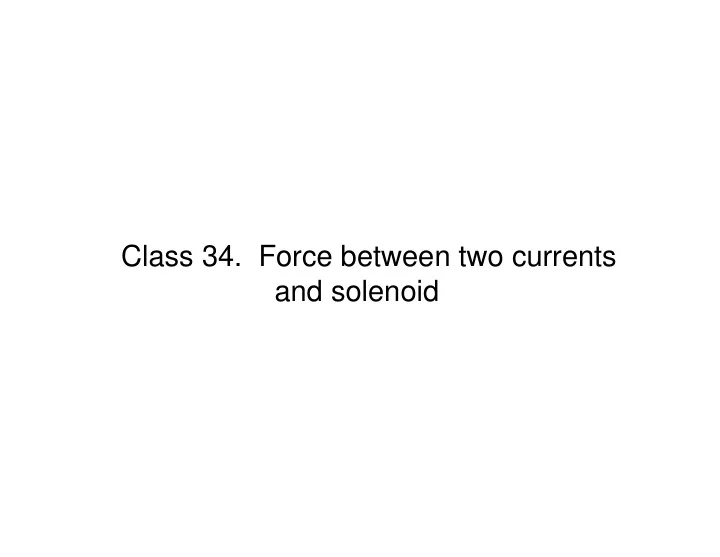

Class 34. Force between two currents and solenoid
Test 3 Bin # students 0 3 30 1 ‐ 5 0 6 ‐ 10 0 11 ‐ 15 0 25 16 ‐ 20 0 21 ‐ 25 0 20 26 ‐ 30 0 31 ‐ 35 2 # Students 36 ‐ 40 0 15 41 ‐ 45 0 Frequency 46 ‐ 50 2 10 51 ‐ 55 3 56 ‐ 60 4 61 ‐ 65 8 5 66 ‐ 70 4 71 ‐ 75 13 0 76 ‐ 80 11 81 ‐ 85 21 86 ‐ 90 26 Score 91 ‐ 95 18 # students Total number of students: 127 96 ‐ 100 12 Class average: 79.2 92 ‐ 100 A 26 Sample standard deviation: 18.5 80 ‐ 91 B 54 55 ‐ 79 C 38 Top ¼ percentile: 90 36 ‐ 54 D 4 Median: 84 0 ‐ 35 E 5 Top ¾ percentile: 73 127 students
Magnetic field due to a long wire Want to calculate the magnetic field B B at point P. P By symmetry argument, B is in the plane of the paper (infinite long r wire), has the same magnitude for I all points on the dotted circular loop (azimuthal symmetry), and tangent to the circular loop (so cos =1). B d s B 2 r Ampere’s Law: B d s I B 2 r I 0 0 I 0 B 2 r
Magnetic Force Between Two Parallel Long Wires Magnetic field at point P due to I 1 : B I 0 1 B 2 r P If another current I 2 parallel to I 1 is If another current I 2 parallel to I 1 is r passing through point P, it will passing through point P, it will I 1 experience a force because of the experience a force because of the field there. field there.
Magnetic Force Between Two Parallel Long Wires Magnetic field at point P due to I 1 : I B 0 1 B 2 r P If another current I 2 parallel to I 1 is If another current I 2 parallel to I 1 is r F B passing through point P, it will passing through point P, it will I 1 experience a force because of the experience a force because of the field there. field there. o F I L B F I BL sin 90 I BL B 2 B 2 2 I 0 1 F I L B 2 2 r F I I B 0 1 2 L 2 r Force is attractive if the two currents are in the same direction, repulsive if the two currents are in opposite direction.
Solenoid L I B If n = number of turns per unit length B d s B L Ampere’s Law: B d s I B L (nL) I 0 0 B n I 0 Note that B is proportional to the number of turns per unit length, but not the total number of turns.
Recommend
More recommend